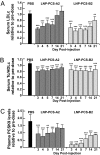Therapeutic RNAi targeting PCSK9 acutely lowers plasma cholesterol in rodents and LDL cholesterol in nonhuman primates
- PMID: 18695239
- PMCID: PMC2575310
- DOI: 10.1073/pnas.0805434105
Therapeutic RNAi targeting PCSK9 acutely lowers plasma cholesterol in rodents and LDL cholesterol in nonhuman primates
Abstract
Proprotein convertase subtilisin/kexin type 9 (PCSK9) regulates low density lipoprotein receptor (LDLR) protein levels and function. Loss of PCSK9 increases LDLR levels in liver and reduces plasma LDL cholesterol (LDLc), whereas excess PCSK9 activity decreases liver LDLR levels and increases plasma LDLc. Here, we have developed active, cross-species, small interfering RNAs (siRNAs) capable of targeting murine, rat, nonhuman primate (NHP), and human PCSK9. For in vivo studies, PCSK9 and control siRNAs were formulated in a lipidoid nanoparticle (LNP). Liver-specific siRNA silencing of PCSK9 in mice and rats reduced PCSK9 mRNA levels by 50-70%. The reduction in PCSK9 transcript was associated with up to a 60% reduction in plasma cholesterol concentrations. These effects were shown to be mediated by an RNAi mechanism, using 5'-RACE. In transgenic mice expressing human PCSK9, siRNAs silenced the human PCSK9 transcript by >70% and significantly reduced PCSK9 plasma protein levels. In NHP, a single dose of siRNA targeting PCSK9 resulted in a rapid, durable, and reversible lowering of plasma PCSK9, apolipoprotein B, and LDLc, without measurable effects on either HDL cholesterol (HDLc) or triglycerides (TGs). The effects of PCSK9 silencing lasted for 3 weeks after a single bolus i.v. administration. These results validate PCSK9 targeting with RNAi therapeutics as an approach to specifically lower LDLc, paving the way for the development of PCSK9-lowering agents as a future strategy for treatment of hypercholesterolemia.
Conflict of interest statement
Conflict of interest statement: R.L. is a shareholder and member of the Scientific Advisory Board of Alnylam. D.G.A. and J.D.H. are consultants of Alynylam Pharmaceuticals. Alnylam also has a license to certain intellectual property invented at Massachusetts Institute of Technology by Drs. Anderson, Langer, and colleagues. M.F.-K., T.S.R., A.A., D.B., K.C., R.D., Y.F., C.G.-V., M. Jayaraman, K.N.J., M. Maier, L.N., K.G.R., T.R., J.S., J.W., G.W., T.Z., A.d.F., M. Manoharan, V.K., and K.F. are employees of Alnylam Pharmaceuticals. B.B., P.H., M. John, I.R., P.T., and H.-P.V. are employees of Roche Kulmbach.
Figures





References
-
- Bassi DE, Fu J, Lopez de Cicco R, Klein-Szanto AJ. Proprotein convertases: “Master switches” in the regulation of tumor growth and progression. Mol Carcinog. 2005;44:151–161. - PubMed
-
- Abifadel M, et al. Mutations in PCSK9 cause autosomal dominant hypercholesterolemia. Nat Genet. 2003;34:154–156. - PubMed
Publication types
MeSH terms
Substances
Grants and funding
LinkOut - more resources
Full Text Sources
Other Literature Sources
Molecular Biology Databases
Miscellaneous

